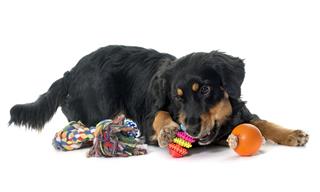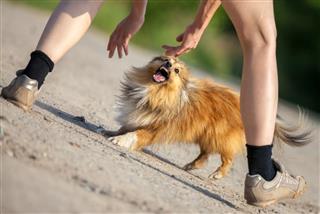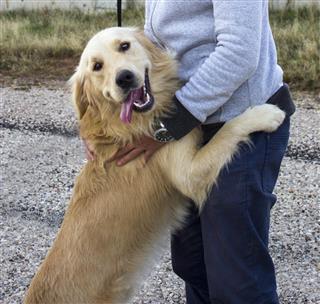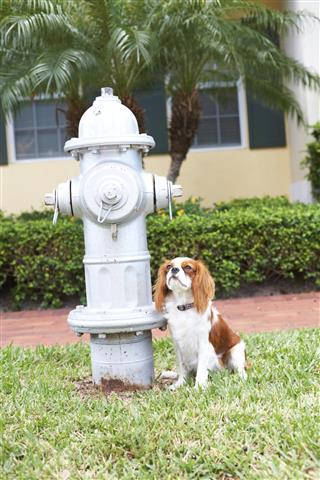
Many times, dogs behave in ways that their owners cannot understand. This article lists some common behavioral traits in dogs that confuse their owners.
Dogs are generally easy to understand and can make their feelings known without much trouble. However, sometimes, your dog may behave in a manner that’s baffling. It’s not necessary that questions about a dog’s behavior only arise in case of first time owners. Sometimes, experienced dog owners are also at a loss to explain the reason behind such surprising behavior. When it comes to doubts about health or behavior, a veterinarian can help you best. The following are some typical behavioral traits exhibited by dogs that you may find insightful.
Basics of Puppy Behavior
A new puppy, along with being a new family member, can sometimes drive you completely round the bend with its never-ending energy levels. Most puppies adjust fairly well as soon as you get them home, though you can help smooth the transition by lavishing him/her with special attention and care. Be encouraging and loving. Let him/her explore the surroundings and sniff around corners till he/she gets familiarized with the new home. The most common puppy behavior questions involve barking, chewing, and house training. The first thing to understand is that these are all normal behavioral traits.
Barking
Barking is a part of any dog’s behavior, although puppies may bark a whole lot more than older dogs. This is because it is the easiest way for them to get your attention, whether they’re hungry, thirsty, or just want their tummies scratched. Most often, incessant barking will lessen as they grow up and understand that there are other ways to get your attention, specifically if you are firm with them from a young age.
Chewing
Puppies chew when they are teething, just like babies. Chewing helps strengthen the teeth, and can also provide relief from teething pain. It’s important to let your puppy chew on something, but train him/her on what’s chewable and what isn’t. If that isn’t working and the chew toys are still uninteresting, keep all things of value out of reach and puppy proof the house.
House Training
Initially, when potty-training puppies, it’s a good idea to take them to a particular spot regularly and familiarize them with it. When very small, puppies need to be taken out regularly to avoid ‘accidents’. Dogs learn by repetition and respond to the tone of your voice, so remember to visit the same spot, and praise your pup if he/she has been good.
Basics of Dog Behavior
In most cases, an adult dog will settle into a routine with its owners without much of a problem. However, moving houses, a change in routine, or separation for long periods of time can result in a changed behavior. The following are some common behavioral problems you may encounter.
Jumping
Jumping up onto someone is one of the most common problems dog owners face, and it can be especially problematic if you have a big dog. This behavior is your dog’s way of welcoming you home, and the best way to deal with it is to ignore your dog once you enter (heartbreaking though it may be), until he/she calms down. On repetition, he/she will learn to respond to this treatment and greet you more sedately.
Aggressive behavior
This is a problem in adult dogs that need attention. Sometimes, aggression can be related to a past incident, specifically in rescued or rehabilitated dogs. Essentially, it arises out of fear or dominance. Dogs who are aggressive when afraid will generally flatten their ears against the head and crouch low, with their bodies angled away from the source of fear. Dogs who exhibit dominance aggression will have their ears erect and their bodies angled forward, ready to lunge. This behavior is best dealt with, in coordination with a behavioral counselor who will give you the required advice.
Separation Anxiety
Typically, separation anxiety exhibits itself in destructive behavior in dogs. You might come home to find something chewed on or something destroyed, after having left your dog alone for more time than he/she is able to handle. This is a ploy to get your attention. Your dog feels anxious and abandoned, and deals with this feeling by chewing or biting. Disciplining will not help in this situation. The best way to work around this is with love and attention. Spend some extra time with your dog, maybe take him/her for a longer walk than usual, and leave some toys around to keep him/her occupied.
Dogs are the most fantastic friends you can have – they’re faithful, loving, and fabulous to hang out with. A dog will listen to you for hours on end, and is more in tune with your emotions than you can ever imagine. Questions about your dog’s behavior will arise from time to time, and you will receive all sorts of advice. However, remember, you understand your dog better than most, so pay attention to the signals and you may find the answer yourself.







